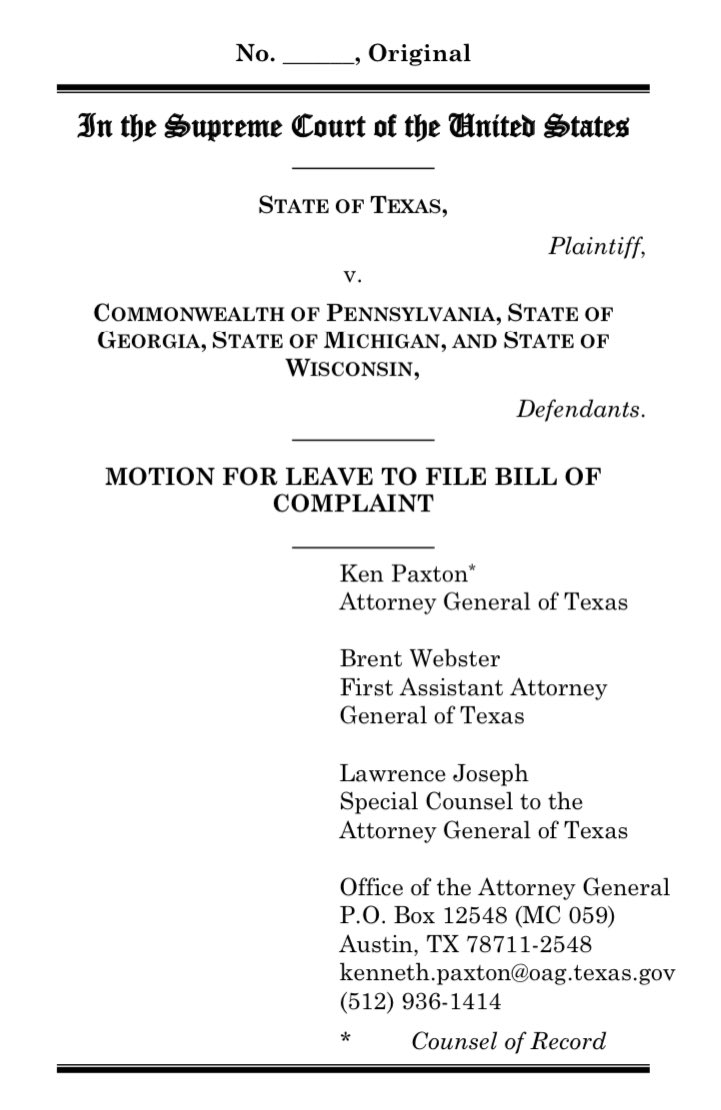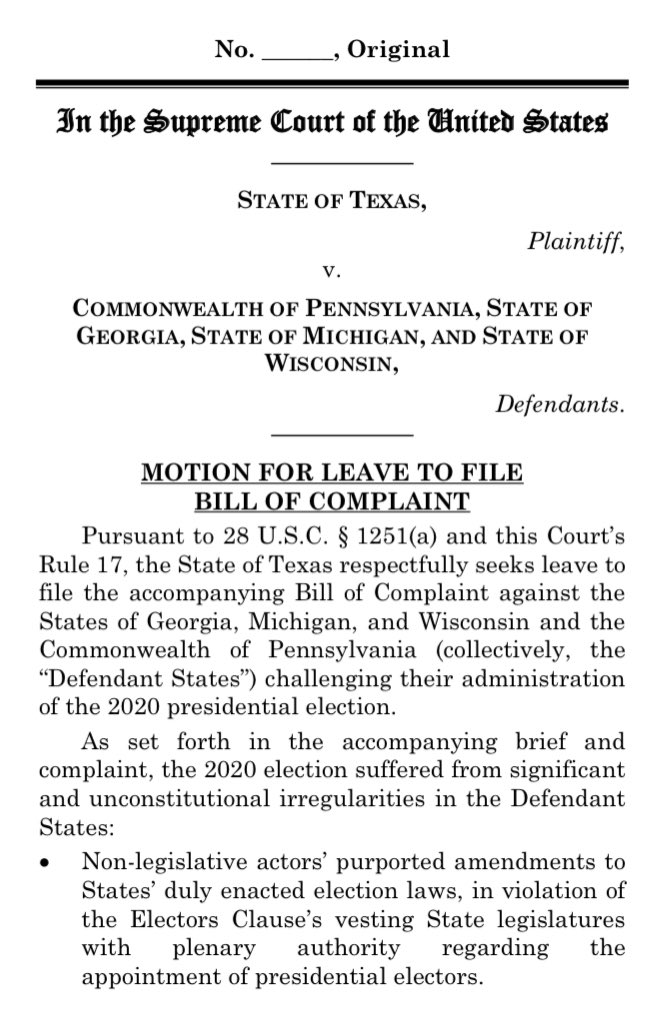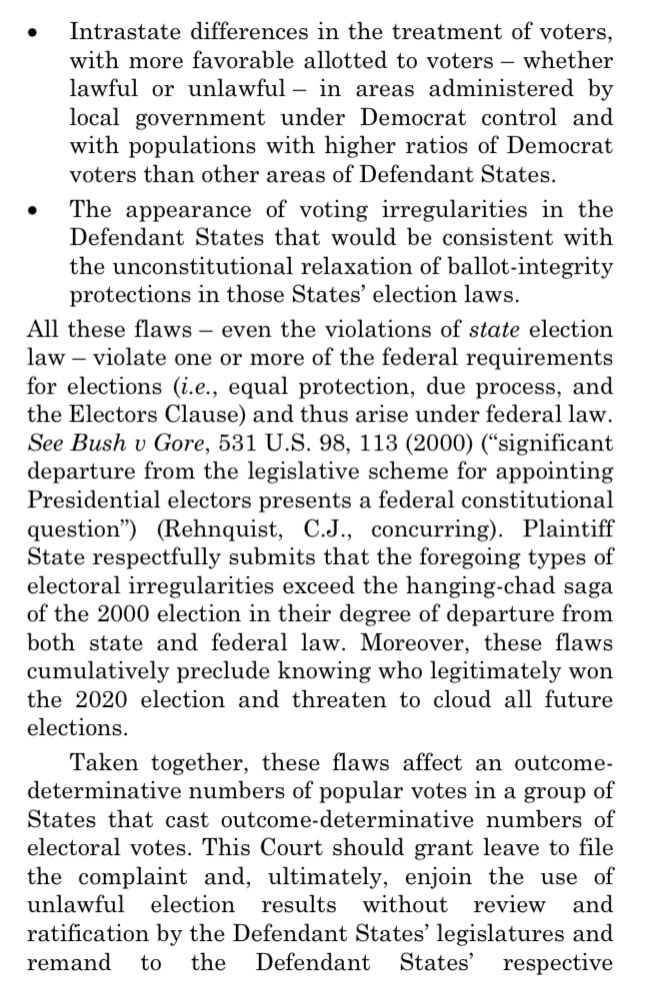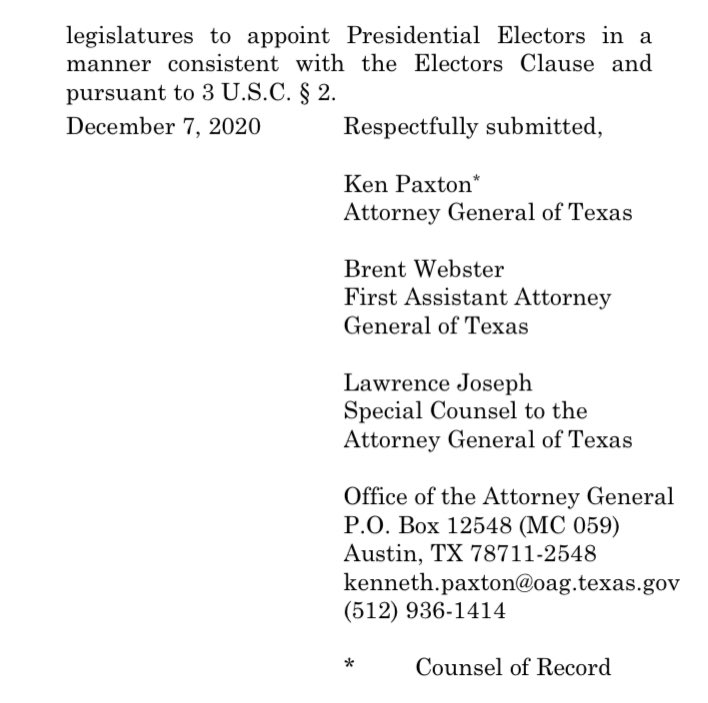
1. Texas is trying to sue PA, GA, MI, and WI to challenge their election results *directly* in #SCOTUS.
How can it do that, how does that work, and is this going anywhere?
Here's a quick #thread on the apex of legal arcana:
The U.S. Supreme Court's "original jurisdiction."
How can it do that, how does that work, and is this going anywhere?
Here's a quick #thread on the apex of legal arcana:
The U.S. Supreme Court's "original jurisdiction."
2. One of the reasons *why* the Founders created a Supreme Court was to resolve interstate disputes (e.g., over borders, water rights, etc.).
Because lower courts might be biased, #SCOTUS was given "original" jurisdiction in such cases — allowing such suits to *start* there.
Because lower courts might be biased, #SCOTUS was given "original" jurisdiction in such cases — allowing such suits to *start* there.
3. And today, in suits between states, #SCOTUS's original jurisdiction is *exclusive,* meaning that lower state and federal courts *lack* the power to hear disputes between two or more states:
law.cornell.edu/uscode/text/28…
law.cornell.edu/uscode/text/28…
4. But the Court has long understood "exclusive" to *not* mean "mandatory," even though some Justices (such as Justice Thomas) believe that it is.
Instead, states must seek "leave to file" an original bill of complaint, and such a motion is *not* granted as a matter of course.
Instead, states must seek "leave to file" an original bill of complaint, and such a motion is *not* granted as a matter of course.
5. One of the factors the Justices look to is whether the *issues* in the case can be resolved in other cases in the lower courts, even if not between the same parties. Thus, the Court usually denies leave unless it's a *uniquely* state-state dispute (again, like borders/water).
6. Among lots of other things, that's almost certainly fatal to this crazy new Texas suit. As we've seen, these claims are already being brought in private suits in each of those states. Texas offers no explanation for why the issues can't be (and aren't being) addressed there.
7. And it's not for nothing that the Justices don't *like* "original" cases, partly because they don't come with a well-developed record and set of opinions from lower courts.
Indeed, the "original" docket has shrunk to an average of <1 argued case per Term in recent years.
Indeed, the "original" docket has shrunk to an average of <1 argued case per Term in recent years.
8. The other reason they don't like these cases is because they're worried about opening the floodgates. If Texas can sue these states over how they conduct their elections, what's to stop Vermont from suing Texas over how it regulates the oil industry, or other permutations.
9. For instance, when Nebraska and Wyoming recently tried to sue Colorado over its legalization of marijuana directly at #SCOTUS, the Court refused, presumably for all of these reasons (albeit over a dissent from Thomas & Alito):
supremecourt.gov/opinions/15pdf…
supremecourt.gov/opinions/15pdf…
10. Finally, it's worth stressing that these cases take forever—even *before* #SCOTUS votes on the motion.
TX sought leave to file another novel lawsuit against CA back in February, and the Court *still* hasn't acted on its motion for leave to file:
supremecourt.gov/search.aspx?fi…
TX sought leave to file another novel lawsuit against CA back in February, and the Court *still* hasn't acted on its motion for leave to file:
supremecourt.gov/search.aspx?fi…
11. All of this is to say, yes, #SCOTUS *can* hear this case. And it's possible one or two Justices will think that it *should.*
But it's going to take forever to decide whether to hear it—which almost certainly means that the whole thing will be moot before that happens.
/end
But it's going to take forever to decide whether to hear it—which almost certainly means that the whole thing will be moot before that happens.
/end
• • •
Missing some Tweet in this thread? You can try to
force a refresh









